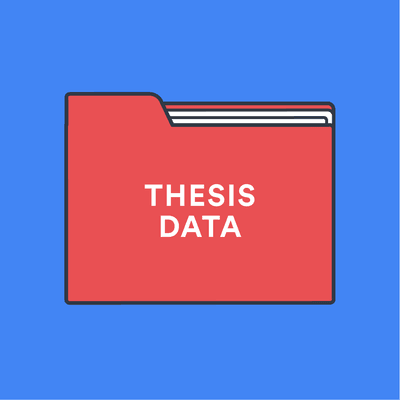How to collect data for your thesis

After choosing a topic for your thesis, you’ll need to start gathering data. In this article, we focus on how to effectively collect theoretical and empirical data.
Empirical data: unique research that may be quantitative, qualitative, or mixed.
Theoretical data: secondary, scholarly sources like books and journal articles that provide theoretical context for your research.
Thesis: the culminating, multi-chapter project for a bachelor’s, master’s, or doctoral degree.
Qualitative data: info that cannot be measured, like observations and interviews.
Quantitative data: info that can be measured and written with numbers.
Collecting theoretical data
At this point in your academic life, you are already acquainted with the ways of finding potential references. Some obvious sources of theoretical material are:
- journals
- monographs
- edited volumes
- conference proceedings
- online databases like Google Scholar, ERIC, or Scopus
You can also take a look at the top list of academic search engines.
Search for theses on your topic
Looking at other theses on your topic can help you see what approaches have been taken and what aspects other writers have focused on. Pay close attention to the list of references and follow the bread-crumbs back to the original theories and specialized authors.
Use content-sharing platforms
Another method for gathering theoretical data is to read through content-sharing platforms. Many people share their papers and writings on these sites. You can either hunt sources, get some inspiration for your own work or even learn new angles of your topic.
Some popular content sharing sites are:
With these sites, you have to check the credibility of the sources. You can usually rely on the content, but we recommend double-checking just to be sure. Take a look at our guide on what are credible sources?
The more you know, the better. The guide, "How to undertake a literature search and review for dissertations and final year projects," will give you all the tools needed for finding literature.
Collecting empirical data
In order to successfully collect empirical data, you have to choose first what type of data you want as an outcome. There are essentially two options, qualitative or quantitative data. Many people mistake one term with the other, so it’s important to understand the differences between qualitative and quantitative research.
Boiled down, qualitative data means words and quantitative means numbers. Both types are considered primary sources. Whichever one adapts best to your research will define the type of methodology to carry out, so choose wisely.
Qualitative vs. Quantitative data
| Data type | What is it? | Methodology |
|---|---|---|
Quantitative | Information that can be measured and written with numbers. This type of data claims to be credible, scientific and exact. | Surveys, tests, existing databases |
Qualitative | Information that cannot be measured. It may involve multimedia material or non-textual data. This type of data claims to be detailed, nuanced and contextual. | Observations, interviews, focus groups |
In the end, having in mind what type of outcome you intend and how much time you count on will lead you to choose the best type of empirical data for your research. For a detailed description of each methodology type mentioned above, read more about collecting data.
Once you gather enough theoretical and empirical data, you will need to start writing. But before the actual writing part, you have to structure your thesis to avoid getting lost in the sea of information. Take a look at our guide on how to structure your thesis for some tips and tricks.
Frequently Asked Questions about gathering data for your thesis
💅 What type of data should I collect for my thesis?
The key to knowing what type of data you should collect for your thesis is knowing in advance the type of outcome you intend to have, and the amount of time you count with.
🔈 How do I collect theoretical data for my thesis?
Some obvious sources of theoretical material are journals, libraries and online databases like Google Scholar, ERIC or Scopus, or take a look at the top list of academic search engines. You can also search for theses on your topic or read content sharing platforms, like Medium, Issuu, or Slideshare.
📊 How do I collect empirical data for my thesis?
To gather empirical data, you have to choose first what type of data you want. There are two options, qualitative or quantitative data. You can gather data through observations, interviews, focus groups, or with surveys, tests, and existing databases.
📉 What is qualitative data?
Qualitative data means words, information that cannot be measured. It may involve multimedia material or non-textual data. This type of data claims to be detailed, nuanced and contextual.
📈 What is quantitative data?
Quantitative data means numbers, information that can be measured and written with numbers. This type of data claims to be credible, scientific and exact.


